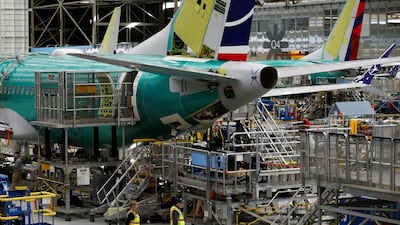The US aviation regulator discovered a new safety risk in the troubled Boeing 737 Max jet and ordered the plane maker to make additional design changes, further delaying the grounded plane's return to the skies.
The Federal Aviation Administration's process is designed to discover and highlight potential risks, it said on Wednesday. Boeing's shares dropped 4.5 per cent at the start of market trading on Thursday.
"The FAA recently found a potential risk that Boeing must mitigate," the agency said without elaborating. "The FAA will lift the aircraft’s prohibition order when we deem it is safe to do so."
Boeing has been working to return its most profitable aircraft back to service from a global grounding that was imposed in March in the wake of two fatal crashes within five months killing 346 people.
The plane manufacturer is addressing the issue by removing a potential source of "uncommanded" movement by the jet’s stabiliser.
"Boeing agrees with the FAA's decision and request, and is working on the required software," it said.
The latest fault was discovered during a simulator test last week and it is not yet clear if the issue can be addressed with a software upgrade or will require a more complex hardware fix, Reuters reported. An FAA test pilot during a simulator check was running scenarios meant to intentionally activate the MCAS stall-prevention system, according to the news agency. During one activation, it took an extended period to recover the stabiliser trim system that is used to control the aircraft.
Boeing has been working on a software upgrade on the Max's stall-prevention system known as MCAS since Indonesia's Lion Air crash in October.
"Federal Aviation Administration identified an additional requirement that it has asked the company to address through the software changes that the company has been developing for the past eight months," Boeing said.
The discovery means Boeing will not conduct a certification test flight until July 8 in the best-case scenario, though it could face delays beyond that, Reuters said.
The FAA said it will "continue to evaluate Boeing’s software modification to the MCAS and we are still developing necessary training requirements."
The company is also working on recommendations from the Technical Advisory Board, an independent panel reviewing its work regarding 737 Max's return to service.
The International Air Transport Association (Iata) called on global aviation regulators and the FAA to align their efforts on technical validation requirements, crew training requirements and timelines to return the Max to the skies.
Iata recognised the role of the FAA as a Max certifying regulator and acknowledged the need for other safety regulators to make independent decisions while urging for unity.
Aviation "relies on global standards, including mutual recognition, trust, and reciprocity among safety regulators", Alexandre de Juniac, Iata director general, said in a statement on Thursday. "Aviation cannot function efficiently without this coordinated effort, and restoring public confidence demands it."
The comments came after Iata met with more than 40 airlines, safety regulatory authorities, plane manufacturers and aircraft lessors at the second Boeing 737 Max summit in Montreal on Wednesday.

